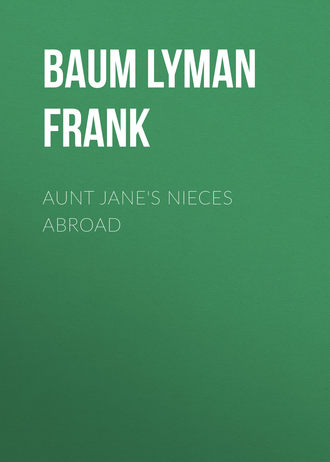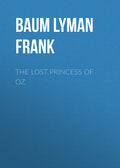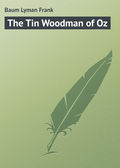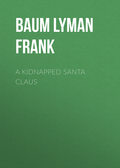
Лаймен Фрэнк Баум
Aunt Jane's Nieces Abroad
CHAPTER XXII
NEWS AT LAST
Kenneth Forbes had always been an unusual boy. He had grown up in an unfriendly atmosphere, unloved and uncared for, and resented this neglect with all the force of his impetuous nature. He had hated Aunt Jane, and regarded her as cruel and selfish – a fair estimate of her character – until Aunt Jane's nieces taught him to be more considerate and forgiving. Patricia, especially, had exercised a gentler influence upon the arbitrary youth, and as a consequence they had become staunch friends.
When the unexpected inheritance of a fortune changed the boy's condition from one of dependence to one of importance he found he had no longer any wrongs to resent; therefore his surly and brusque moods gradually disappeared, and he became a pleasant companion to those he cared for. With strangers he still remained reserved and suspicious, and occasionally the old sullen fits would seize him and it was well to avoid his society while they lasted.
On his arrival at Taormina, Kenneth had entered earnestly into the search for Uncle John, whom he regarded most affectionately; and, having passed the day tramping over the mountains, he would fill the evening with discussions and arguments with the nieces concerning the fate of their missing uncle.
But as the days dragged wearily away the search slackened and was finally abandoned. Kenneth set up his easel in the garden and began to paint old Etna, with its wreath of snow and the soft gray cloud of vapor that perpetually hovered over it.
"Anyone with half a soul could paint that!" said Patsy; and as a proof of her assertion the boy did very well indeed, except that his uneasiness on Mr. Merrick's account served to distract him more or less.
Nor was Kenneth the only uneasy one. Mr. Watson, hard-headed man of resource as he was, grew more and more dejected as he realized the impossibility of interesting the authorities in the case. The Sicilian officials were silent and uncommunicative; the Italians wholly indifferent. If strangers came to Taormina and got into difficulties, the government was in no way to blame. It was their duty to tolerate tourists, but those all too energetic foreigners must take care of themselves.
Probably Mr. Watson would have cabled the State Department at Washington for assistance had he not expected each day to put him in communication with his friend, and in the end he congratulated himself upon his patience. The close of the week brought a sudden and startling change in the situation.
The girls sat on the shaded terrace one afternoon, watching the picture of Etna grow under Kenneth's deft touches, when they observed a child approaching them with shy diffidence. It was a beautiful Sicilian boy, with wonderful brown eyes and a delicate profile. After assuring himself that the party of young Americans was quite separate from any straggling guest of the hotel, the child came near enough to say, in a low tone:
"I have a message from Signor Merrick."
They crowded around him eagerly then, raining questions from every side; but the boy shrank away and said, warningly:
"If we are overheard, signorini mia, it will be very bad. No one must suspect that I am here."
"Is my uncle well?" asked Patsy, imploringly.
"Quite well, mees."
"And have you also news of Count Ferralti?" anxiously enquired Louise.
"Oh, Ferralti? He is better. Some teeth are knocked out, but he eats very well without them," replied the child, with an amused laugh.
"Where are our friends, my lad?" Kenneth asked.
"I cannot describe the place, signore; but here are letters to explain all." The child produced a bulky package, and after a glance at each, in turn, placed it in Patsy's hands. "Read very secretly, signorini, and decide your course of action. To-morrow I will come for your answer. In the meantime, confide in no one but yourselves. If you are indiscreet, you alone will become the murderers of Signor Merrick and the sad young Ferralti."
"Who are you?" asked Beth, examining the child closely.
"I am called Tato, signorina mia."
"Where do you live?"
"It is all explained in the letters, believe me."
Beth glanced at Patricia, who was examining the package, and now all crowded around for a glimpse of Uncle John's well-known handwriting. The wrapper was inscribed:
"To Miss Doyle, Miss De Graf and Miss Merrick,
Hotel Castello-a-Mare, Taormina.By the safe hands of Tato."
Inside were two letters, one addressed to Louise personally. She seized this and ran a little distance away, while Beth took Uncle John's letter from Patsy's trembling hands, and having opened it read aloud in a clear and composed voice the following:
"My dear Nieces: (and also my dear friends, Silas Watson and Kenneth Forbes, if they are with you) Greeting! You have perhaps been wondering at my absence, which I will explain by saying that I am visiting a noble acquaintance in a very cozy and comfortable retreat which I am sure would look better from a distance. My spirits and health are A No. 1 and it is my intention to return to you as soon as you have executed a little commission for me, which I want you to do exactly as I hereby instruct you. In other words, if you don't execute the commission you will probably execute me.
"I have decided to purchase a valuable antique ring from my host, at a price of fifty thousand dollars, which trifling sum I must have at once to complete the transaction, for until full payment is made I cannot rejoin you. Therefore you must hasten to raise the dough. Here's the programme, my dear girls: One of you must go by first train to Messina and cable Isham, Marvin & Co. to deposit with the New York correspondents of the Banca Commerciale Italiana fifty thousand dollars, and have instructions cabled to the Messina branch of that bank to pay the sum to the written order of John Merrick. This should all be accomplished within twenty-four hours. Present the enclosed order, together with my letter of credit and passport, which will identify my signature, and draw the money in cash. Return with it to Taormina and give it secretly to the boy Tato, who will bring it to me. I will rejoin you within three hours after I have paid for the ring.
"This may seem a strange proceeding to you, my dears, but you must not hesitate to accomplish it – if you love me. Should my old friend Silas Watson be now with you, as I expect him to be, he will assist you to do my bidding, for he will be able to realize, better than I can now explain, how important it is to me.
"Also I beg you to do a like service for Count Ferralti, who is entrusting his personal commission, to Louise. He also must conclude an important purchase before he can return to Taormina.
"More than this I am not permitted to say in this letter. Confide in no stranger, or official of any sort, and act as secretly and quietly as possible. I hope soon to be with you.
"Very affectionately, Uncle John."
"What does it all mean?" asked Patsy, bewildered, when Beth had finished reading.
"Why, it is clear enough, I'm sure," said Kenneth. "Uncle John is imprisoned by brigands, and the money he requires is his ransom. We must get it as soon as possible, you know, and luckily he is so rich that he won't miss this little draft at all."
Beth sat silent, angrily staring at the letter.
"I suppose," said Patsy, hesitating, "the robbers will do the dear uncle some mischief, if he doesn't pay."
"Just knock him on the head, that's all," said the boy. "But there's no need to worry. We can get the money easily."
Suddenly Beth jumped up.
"Where's that girl?" she demanded, sharply.
"What girl?"
"Tato."
"Tato, my dear coz, is a boy," answered Kenneth; "and he disappeared ages ago."
"You must be blind," said Beth, scornfully, "not to recognize a girl when you see one. A boy, indeed!"
"Why, he dressed like a boy," replied Kenneth, hesitatingly.
"So much the more disgraceful," sniffed Beth. "She belongs to those brigands, I suppose."
"Looks something like Victor Valdi," said Patsy, thoughtfully.
"Il Duca? Of course! I see it myself, now. Patricia, it is that wicked duke who has captured Uncle John."
"I had guessed that," declared Patsy, smiling.
"He must be a handsome rascal," observed Kenneth, "for the child is pretty as a picture."
"He isn't handsome at all," replied Beth; "but there is a look about the child's eyes that reminds me of him."
"That's it, exactly," agreed Patsy.
Louise now approached them with a white, frightened face.
"Isn't it dreadful!" she moaned. "They are going to kill Ferralti unless he gives them thirty thousand dollars."
"And I don't believe he can raise thirty cents," said Patsy, calmly.
"Oh, yes, he can," answered Louise, beginning to cry. "Hi – his – father is d – dead, and has left him – a – fortune."
"Don't blubber, Lou," said the boy, chidingly; "in that case your dago friend is as well off as need be. But I suppose you're afraid the no-account Count won't figure his life is worth thirty thousand dollars. It does seem like an awful price to pay for a foreigner."
"It isn't that," said Louise, striving to control her emotion. "He says he hates to be robbed. He wouldn't pay a penny if he could help it."
"Good for the Count! I don't blame him a bit," exclaimed Beth. "It is a beastly shame that free born Americans should be enslaved by a crew of thieving Sicilians, and obliged to purchase their freedom!"
"True for you," said Kenneth, nodding. "But what are we going to do about it?"
"Pay, of course," decided Patsy, promptly. "Our Uncle John is too precious to be sacrificed for all the money in the world. Come; let's go and find Mr. Watson. We ought not to lose a moment's time."
The lawyer read Uncle John's letter carefully, as well as the one from Count Ferralti, which Louise confided to him with the request that he keep the young man's identity a secret for a time, until he could reveal it to her cousins in person.
"The only thing to be done," announced Mr. Watson, "is to carry out these instructions faithfully. We can send the cable messages from here, and in the morning Louise and I will take the train for Messina and remain there until we get the money."
"It's an outrage!" cried Beth.
"Of course, my dear. But it can't be helped. And your uncle is wise to take the matter so cheerfully. After all, it is little enough to pay for one's life and liberty, and our friend is so wealthy that he will never feel the loss at all."
"It isn't that; it's the principle of the thing that I object to," said the girl. "It's downright disgraceful to be robbed so easily."
"To be sure; but the disgrace is Italy's, not ours. Object all you want to, Beth, dear," continued the old lawyer, smiling at her; "but nevertheless we'll pay as soon as possible, and have done with it. What we want now is your Uncle John, and we want him mighty badly."
"Really, the pirates didn't charge enough for him," added Patsy.
So Mr. Watson sent the cables to John Merrick's bankers and Count Ferralti's attorney, and the next morning went with Louise to Messina.
Frascatti drove all the party down the road to the station at Giardini, and as the train pulled out, Beth, who had remained seated in the victoria with Patricia and Kenneth, suddenly stood up to pull the vetturino's sleeve.
"Tell me, Frascatti," she whispered, "isn't that Il Duca's child? Look – that little one standing in the corner?"
"Why, yes; it is really Tato," answered the man, before he thought to deny it.
"Very well; you may now drive us home," returned Beth, a shade of triumph in her voice.
CHAPTER XXIII
BETH BEGINS TO PLOT
Once back in their sitting-room behind closed doors, Beth, Patsy and Kenneth got their three heads together and began eagerly to discuss a plot which Beth had hinted of on the way home and now unfolded in detail. And while they still whispered together a knock at the door startled them and made them look rather guilty until the boy answered the call and admitted little Tato.
The child's beautiful face wore a smile of demure satisfaction as Tato bowed respectfully to the young Americans.
Kenneth winked at Beth from behind the visitor's back.
"As you have a guest," he remarked, with a yawn that was somewhat rude, "I shall now go and take my nap."
"What, do you sleep so early in the day, you lazy-bones?" asked Patsy, brightly.
"Any time, my dear, is good enough for an overworked artist," he replied. "Au revoir, my cousins. See you at luncheon."
With this he strolled away, and when he had gone Beth said to Tato:
"Won't you sit down, signorina?"
"Do you mean me?" asked the child, as if surprised.
"Yes; I can see plainly that you are a girl."
"And a pretty one, too, my dear," added Patsy.
Tato blushed as if embarrassed, but in a moment smiled upon the American girls.
"Do you think me immodest, then?" she asked, anxiously.
"By no means, my dear," Beth assured her. "I suppose you have an excellent reason for wearing boys' clothes."
"So I have, signorina. I live in the mountains, where dresses catch in the crags, and bother a girl. And my father has always been heart-broken because he had no son, and likes to see me in this attire. He has many errands for me, too, where a boy may go unnoticed, yet a girl would attract too much attention. This is one of the errands, signorini. But now tell me, if you please, how have you decided to answer the letters of Signor Merrick and Signor Ferralti?"
"Oh, there was but one way to answer them, Tato," replied Beth, composedly. "We have sent Mr. Watson and our cousin Louise Merrick to Messina to get the money. If our friends in America act promptly Mr. Watson and Louise will return by to-morrow afternoon's train, and be prepared to make the payment."
"That is well, signorina," responded Tato.
"We are to give the money to you, I suppose?" said Patsy.
"Yes; I will return for it to-morrow afternoon," answered the child, with business-like gravity. Then she looked earnestly from one to the other of the two girls. "You must act discreetly, in the meantime, you know. You must not talk to anyone, or do anything to imperil your uncle's safety."
"Of course not, Tato."
"I beg you not, signorini. The uncle is a good man, and brave. I do not wish him to be injured."
"Nor do we, Tato."
"And the young man is not a coward, either. He has been kind to me. But he is sad, and not so pleasant to talk with as the uncle."
"True enough, Tato," said Beth.
Patsy had been examining the child with curious intentness. The little one was so lovely and graceful, and her voice sounded so soft and womanly, that Patsy longed to take her in her arms and hug her.
"How old are you, dear?" she asked.
Tato saw the friendly look, and answered with a smile.
"Perhaps as old as you, signorina, although I am so much smaller. I shall be fifteen in a month."
"So old!"
Tato laughed merrily.
"Ah, you might well say 'so young,' amico mia! To be grown up is much nicer; do you not think so? And then I shall not look such a baby as now, and have people scold me when I get in the way, as they do little bambini."
"But when you are grown you cannot wear boys' clothing, either."
Tato sighed.
"We have a saying in Sicily that 'each year has its sunshine and rain,' which means its sorrow and its joy," she answered. "Perhaps I sometimes think more of the tears than of the laughter, although I know that is wrong. Not always shall I be a mountaineer, and then the soft dresses of the young girls shall be my portion. Will I like them better? I do not know. But I must go now, instead of chattering here. Farewell, signorini, until to-morrow."
"Will you not remain with us?"
"Oh, no; although you are kind. I am expected home. But to-morrow I will come for the money. You will be silent?"
"Surely, Tato."
The child smiled upon them pleasantly. It was a relief to deal with two tender girls instead of cold and resentful men, such as she had sometimes met. At the door she blew a kiss to them, and darted away.
In the courtyard Frascatti saw her gliding out and discreetly turned his head the other way.
Tato took the old road, circling around the theatre and through the narrow, winding streets of the lower town to the Catania Gate. She looked back one or twice, but no one noticed her. If any of the villagers saw her approaching they slipped out of her path.
Once on the highway, however, Tato became lost in reflection. Her mission being successfully accomplished, it required no further thought; but the sweet young American girls had made a strong impression upon the lonely Sicilian maid, and she dreamed of their pretty gowns and ribbons, their fresh and comely faces, and the gentleness of their demeanor.
Tato was not gentle. She was wild and free and boyish, and had no pretty gowns whatever. But what then? She must help her father to get his fortune, and then he had promised her that some day they would go to Paris or Cairo and live in the world, and be brigands no longer.
She would like that, she thought, as she clambered up the steep paths; and perhaps she would meet these American girls again, or others like them, and make them her friends. She had never known a girl friend, as yet.
These ambitions would yesterday have seemed far in the dim future; but now that her stern old grandmother was gone it was possible her father would soon fulfill his promises. While the Duchessa lived she ruled them all, and she was a brigand to the backbone. Now her father's will prevailed, and he could refuse his child nothing.
Kenneth was not an expert detective, but he had managed to keep Tato in sight without being suspected by her. He had concealed himself near the Catania Gate, through which he knew she must pass, and by good luck she had never looked around once, so intent were her musings.
When she came to the end of the path and leaned against the rock to sing the broken refrain which was the "open sesame" to the valley, the boy was hidden snug behind a boulder where he could watch her every movement.
Then the rock opened; Tato passed in, and the opening closed behind her.
Kenneth found a foothold and climbed up the wall of rock, higher and higher, until at last he crept upon a high ridge and looked over.
The hidden valley lay spread before him in all its beauty, but the precipice at his feet formed a sheer drop of a hundred feet or more, and he drew back with a shudder.
Then he took courage to look again, and observed the house, on the porch of which stood Tato engaged in earnest conversation with a tall, dark Sicilian. Uncle John was nowhere to be seen, but the boy understood that he was there, nevertheless, and realized that his prison was so secure that escape was impossible.
And now he climbed down again, a much more difficult feat than getting up. But although he was forced to risk his life several times, he was agile and clear-headed, and finally dropped to the path that led to the secret door of the passage.
His next thought was to mark the exact location of the place, so that he could find it again; and as he returned slowly along the paths through the rocky fissures he took mental note of every curve and communication, and believed he could now find his way to the retreat of the brigands at any time he chose.
CHAPTER XXIV
PATSY'S NEW FRIEND
"I must say that I don't like the job," said Patsy, the next morning, as she stood by the window and faced Beth and Kenneth. "Suppose we fail?"
"In the bright lexicon of youth – "
"Shut up, Ken. If we fail," said Beth, "we will be no worse off than before."
"And if we win," added the boy, "they'll think twice before they try to rob Americans again."
"Well, I'm with you, anyhow," declared Patricia. "I can see it's risky, all right; but as you say, no great harm will be done if we slip up."
"You," announced Beth, gravely, "must be the captain."
"It isn't in me, dear. You figured the thing out, and Ken and I will follow your lead."
"No," said Beth, decidedly; "I'm not quick enough, either in thought or action, to be a leader, Patsy. And there's a bit of deception required that I couldn't manage. That clever little thing, Tato, would know at once I was up to some mischief; but she would never suspect you."
"I like that compliment," replied Patricia. "I may deserve it, of course; but it strikes me Louise is the one best fitted for such work."
"We can't let Louise into this plot," said the boy, positively; "she'd spoil it all."
"Don't be silly, Patsy," said Beth. "You're genuine and frank, and the child likes you. I could see that yesterday. All you have to do is to be nice to her and win her confidence; and then, when the climax comes, you must be the spokesman and talk straight out from the shoulder. You can do that all right."
"I'll bet on her," cried Kenneth, with an admiring look at the girl.
"Then," said Patsy, "it is all arranged, and I'm the captain. And is it agreed that we won't lisp a word to Mr. Watson or Louise?"
"Not a word."
"Here," said Kenneth, drawing a revolver from his pocket, "is Uncle John's pop-gun. It's the only one I could find in his room, so he must have taken the other with him. Be careful of it, Patsy, for it's loaded all 'round. Can you shoot?"
"No; but I suppose the pistol can. I know enough to pull the trigger."
"And when you do, remember to point it away from your friends. Now hide it, my dear, and be careful of it."
Patsy concealed the weapon in the bosom of her dress, not without making a wry face and shivering a bit.
"Have you got your revolver, Beth?" asked the boy.
"Yes."
"And she can shoot just wonderfully!" exclaimed Patsy. "Yesterday she picked an orange off a tree with a bullet. You should have seen her."
"I know," said Ken, nodding. "I've seen Beth shoot before, and she's our main reliance in this conspiracy. For my part, I can hit a mark sometimes, and sometimes I can't. See here." He exhibited a beautiful pearl and silver-mounted weapon which he drew from his pocket. "Mr. Watson and I have carried revolvers ever since we came to Sicily, but we've never had occasion to use them. I can hardly believe, even now, that this beautiful place harbors brigands. It's such a romantic incident in our prosaic world of to-day. And now, young ladies, we are armed to the teeth and can defy an army. Eh, Captain Pat?"
"If you're not more respectful," said the girl, "I'll have you court-marshalled and drummed out of camp."
On the afternoon train came Louise and Mr. Watson from Messina. The American agents had responded promptly, and the bank had honored the orders and delivered the money without delay.
"It is all safe in my satchel," said the lawyer, as they rode together to the hotel; "and our dear friends are as good as rescued already. It's pretty bulky, Kenneth – four hundred thousand lira – but it is all in notes on the Banca d'Italia, for we couldn't manage gold."
"Quite a haul for the brigand," observed Kenneth, thoughtfully.
"True; but little enough for the lives of two men. That is the way I look at the transaction. And, since our friends can afford the loss, we must be as cheerful over the thing as possible. It might have been a tragedy, you know."
Louise shivered.
"I'm glad it is all over," she said, gratefully.
The conspirators looked at one another and smiled, but held their peace.
Arriving at the hotel, Beth and Kenneth at once disappeared, saying they were going to town, as they would not be needed longer. Patsy accompanied their cousin and the lawyer to the sitting-room, where presently Tato came to them.
"Well, little one," said the lawyer, pleasantly, "We have secured the money required to enable Mr. Merrick to purchase the ring, and Mr. – er – Count Ferralti to buy his bracelet. Will you count it?"
"Yes, signore, if you please," replied Tato, with a sober face.
Mr. Watson drew out two packages of bank notes and placed them upon the table. The child, realizing the importance of the occasion, carefully counted each bundle, and then replaced the wrappers.
"The amounts are correct, signore," she said. "I thank you for making my task so easy. And now I will go."
The lawyer brought a newspaper and wrapped the money in it once again.
"It is always dangerous to carry so much money," said he; "but now no one will be likely to suspect the contents of your package."
Tato smiled.
"No one would care to molest me," she said; "for they fear those that protect me. Good afternoon, signore. Your friends will be with you in time to dine in your company. Good afternoon, signorini," turning to Patsy and Louise.
"I'll walk a little way with you; may I?" asked Patsy, smiling into Tato's splendid eyes.
"To be sure, signorina," was the quick response.
Patricia caught up a sunshade and followed the child out at the side entrance, which was little used. Tato took the way along the old road, and Patsy walked beside her, chatting brightly of the catacombs, the Norman villa that showed its checkered tower above the trees and the ancient wall that still hemmed in the little village.
"I love Taormina," she said, earnestly, "and shall be sorry to leave it. You must be very happy, Tato, to be able to live here always."
"It is my birthplace," she said; "but I long to get away from it and see other countries. The view is fine, they say; but it tires me. The air is sweet and pure; but it oppresses me. The climate is glorious; but I have had enough of it. In other places there is novelty, and many things that Sicily knows nothing of."
"That is true," replied Patsy, tucking the little one's arm underneath her own, with a sympathetic gesture. "I know just how you feel, Tato. You must come to America some day, and visit me. I will make you very welcome, dear, and you shall be my friend."
The child looked into her face earnestly.
"You do not hate me, signorina, because – because – "
"Because why?"
"Because my errand to you has been so lawless and – and – unfriendly?"
"Ah, Tato, you do not choose this life, do you?"
"No, signorina."
"It is forced on you by circumstances, is it not?"
"Truly, signorina."
"I know. You would not long so wistfully to change your condition if you enjoyed being a little brigand. But nothing that has passed must interfere with our friendship, dear. If I were in your place, you see, I would do just as you have done. It is not a very honest life, Tato, nor one to be proud of; but I'm not going to blame you one bit."
They had passed the Catania Gate and reached the foot of one of the mountain paths. Tato paused, hesitatingly.
"Oh, I'll go a little farther," said Patsy, promptly. "No one will notice two girls, you know. Shall I carry your parcel for a time?"
"No," replied the child, hugging it close with her disengaged arm. But she offered no objection when Patsy continued to walk by her side.
"Have you any brothers or sisters, Tato?"
"No, signorina."
"Have you a mother?"
"No, signorina. My father and I are alone."
"I know him well, Tato. We were on the ship together, crossing the ocean. He was gruff and disagreeable, but I made him talk to me and smile."
"I know; he has told me of the Signorina Patsy. He is fond of you."
"Yet he robbed my uncle."
The child flushed, and drew away her arm.
"That is it. That is why you should hate me," she replied, bitterly. "I know it is robbery, and brigandage, although my father masks it by saying he sells antiques. Until now I have seen nothing wrong in this life, signorina; but you have made me ashamed."
"Why, dear?"
"Because you are so good and gentle, and so forgiving."
Patsy laughed.
"In reality, Tato, I am resentful and unforgiving. You will find out, soon, that I am a very human girl, and then I will not make you ashamed. But your father's business is shameful, nevertheless."
Tato was plainly puzzled, and knew not what to reply. But just then they reached the end of the crevasse, and the child said:
"You must return now, Signorina Patsy."
"But why cannot I go on with you, and come back with my uncle?"
Tato hesitated. Accustomed as she was to duplicity and acting, in her capacity as lure for her thieving father, the child was just now softened by Patsy's kindly manner and the successful accomplishment of her mission. She had no thought of any treachery or deception on the part of the American girl, and the request seemed to her natural enough.
"If you like," she decided, "you may come as far as the barrier, and there wait for your uncle. It will not be long."
"Very well, dear."
Tato clambered over the dividing rock and dropped into the path beyond. Patsy sprang lightly after her. A short distance farther and they reached the barrier.
"This is the place, signorina. You will sit upon that stone, and wait until your uncle appears." She hesitated, and then added, softly: "I may not see you again. But you will not forget me?"
"Never, Tato. And if you come to America you must not forget to visit me. Remember, whatever happens, that we are friends, and must always remain so."
The child nodded, gratefully. Then, leaning against the face of the cliff, she raised her voice and warbled clearly the bit of song that served as the signal to her father.







